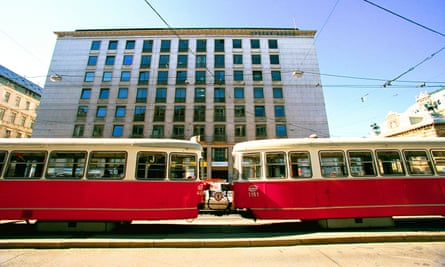Speaking over the phone to Emma Hignett, the voice of London buses and the Overground, is a surreal experience. Tinged with a northern lilt (she grew up between Yorkshire and Lancashire), her voice generally sounds like a stranger’s – until all of a sudden you hear a subtle something that reminds you of being told that you’re on the number 38 bus to Clapton Pond. A voiceover artist, she first auditioned for the Transport for London job in 2005. “It was something completely different,” she says. “There hadn’t been a voice on [the buses] before.”
Hignett’s hiring signalled a changing of the guard. Until then, bus drivers had always made their own announcements – or said nothing at all. When Hignett’s automated voice was rolled out on the 149 from London Bridge to Tottenham, bus drivers were asked for their feedback. To many people’s surprise, they generally liked it. “One of my favourite things was one bus driver who said that all the kids mimicked me,” Hignett recalls.
There are now thousands of voice artists working on city transport worldwide, their job to record the thousands of messages that collectively make up the automatic announcement systems. There’s also a growing trend for synthetic voices. These are “based on human voices”, says Andrew Richards of Acapela Group, which records them before slicing and organising them into an acoustic database for use with text-to-speech technology. They’re becoming increasingly hard to tell apart from human voices.
Are cities losing anything by this? By not having someone standing right there, close enough to see the whites of their eyes, telling you to watch your coffee in the closing doors? Yes, not always being able to hear exactly why you’re going to be late for work might be annoying. But don’t we all love personal touches on our transport, the odd hand-written sign on the tube quoting Homer Simpson or Brandi Snyder? By automating announcements, are we losing a little personality?
From the plethora of articles about the people behind the pre-recorded voices, it’s obvious that the phasing out of live announcements doesn’t have to mean the death of personality on our morning commute. There’s the story of Oswald Laurence whose widow, Dr Margaret McCollum, asked to have her husband’s “mind the gap” announcements reinstated at Embankment underground station. There’s the former soul singer whose voice can now be heard on the New York subway but who has only been on the subway once – in 1957. There’s Charlie Pellett, New York’s “stand clear of the closing doors” guy, who is actually English but spent years trying to get rid of his accent after being teased as a child. There’s the time Conchita Wurst recorded announcements for Vienna when the city was hosting Eurovision. And Emma Clarke, a voice of London Underground since 1999, whose spoof recordings on her own website caused a veritable media frenzy: “We would like to remind our American tourist friends that you are almost certainly talking too loud.”
In some cities, pre-recorded voices are nothing new – Vienna has had them for more than 40 years. “We started them when we discontinued conductors in trams,” explains Dominik Gries of Wiener Linien, the company running most of Vienna’s public transit network. But many cities are just beginning to introduce automated announcements. And with “all of these big metropolises looking for better ways to improve accessibility”, says TfL’s head of bus systems and technology, Simon Reed, pre-recorded messages will become the norm.
The truth is that there are plenty of reasons why it makes sense to have pre-recorded announcements. “Of course you lose some individuality with automation,” says Richards. “But it’s like all technology: when you go from vinyl to CD, you lose the warmth but you gain a format when you can put more songs on the CD, and it sounds better in some ways. When you go from CD to streaming, you can take it around with you – which you couldn’t do before.” (Clearly never a Discman man, then.)
There’s also, Richards points out, the matter of consistency. “Whereas in the past you might have relied on the driver to give announcements, all the training in the world can’t get that to be consistent – [what if] on Monday morning one of them comes in with a cold?”
The accents of some drivers can also prove tricky, particularly for tourists. And pre-recorded announcements can help drivers, too: “Many of our drivers don’t have English as a first language,” says Reed. “They feel a bit intimidated if they have to ask passengers to move down the bus.” Now they can push a button and play Hignett’s pre-recorded message.

Automated announcements have made it simpler to use multiple languages. In Cape Town, according to mayoral committee member for transport Brett Herron, they are still in the infancy of their new public transport system, called MyCiTi. There are plans to roll out announcements on buses by the end of next year, with current discussions about whether to feature Afrikaans, English and isiXhosa. Herron believes “most commuters would accept English only”, but thinks “it would contribute to the project of building an inclusive city if we were to use all three”.
In Vienna, at issue is not only what languages to use (English and Austrian German), but what accent. Angela Schneider has been the voice of the announcements since 2012. (She took over from Wiener Linien security engineer Franz Kaida, who had been doing them for the past 44 years and received a Goldener Rathausmann medal on retirement.) Schneider was chosen, in part, for her Viennese accent – had it been German as spoken in Germany, “people in Vienna would go crazy”, Gries says. “We want to give people a sort of sense of being at home in our public transport system – and that’s hearing a voice that sounds like she’s grown up with you, not in Hamburg.”
Like Londoners (who told TfL they preferred a simple “149” over “route 149”, which TfL duly obeyed), the Viennese prefer minimal announcements – but there was an interesting reaction to an announcement about the next stop. “We tried it as a list,” explains Gries, but “people complained that they felt that it was not good German, even though it’s a bit shorter … Of course our proposal was not false grammar, but maybe it preferred clarity and shortness over very correct grammar.” Sticklers for grammar “said, ‘No, make it right’”.
Unusually for a German-speaking country, Schneider also does the English announcements, to maintain that “feeling that we are in Austria” (while still stressing the need for correct English and being “welcoming hosts”).
When they were choosing a voice in Minneapolis-St Paul, as well, it was important that place names be pronounced as they are by locals. Transit authorities went for one of Acapela’s “out of the box” voices, called Heather, but customised it by modifying the phonetics. “We anticipated that we’d hear from customers if place names were pronounced wrong,” says Gary Nyberg of Metro Transit. “Even if the emphasis is on the wrong syllable, it might sound odd to a customer.”

Having announcements pronounce station names like a native might sound obvious, but it can be a cultural thing: in Sweden, names are pronounced as they are locally, while in Norway they are spoken as a foreigner would probably read them. Perhaps the Swedes are “a little bit more protective of their language”, Richards says.
Hignett, the voice of London buses, has an accent she describes as “RP” (received pronunciation) but not “plummy”, though she admits that she doesn’t think about accent when recording, and more about “putting a smile into it, so it sounds warmer”. She was hired after being judged on a range of criteria: “Clarity, tone, image, appropriateness for the bus operating environment and the type of information the voice would be required to deliver.” TfL did not, Reed explains, simply opt for the cheeriest voice. That simply would not do for London. “If it’s a damp Wednesday morning, you’ve just split up with your partner and you’re going to a job you hate, and then you get someone saying ‘149 to …’” – he puts on a silly, high voice – “then you’ll put bricks through it.”
When a happier-sounding voice announces delays, Richards adds, “It sounds like she’s taking the piss.” So in Brussels, Acapela built two voice options. “Those about delays use a toned-down voice, and then the rest use the more smiley one.” This approach might have helped in the early 1990s on the London tube, when the voice of the first automated in-train announcements was nicknamed Sonia, because she “gets-sonia-nerves”.
In Vienna, as in London, it’s no accident that the voice is female. “When you’re in a station, the background noise is based on a lot of low frequencies, and a male voice tends to get mixed up,” Richards says. The female voice, which is generally an octave higher, is easier to hear. Sometimes, male and female voices are used for contrast. In Stockholm railway stations, “Järda” announces northbound trains, and “Anton” southbound ones. “These voices talk a lot – it can be overwhelming, especially for commuters,” Richards says. “In the morning when you go to work, you can just ignore the male voice because you know it doesn’t concern you.” This also happens in Moscow, but the other way round, eliciting the local gag: “Your boss calls you to work; your wife calls you home.”
The voice of London buses has proof that people continue to react warmly to these transport personalities, even if they are no longer (usually) standing on the platform with you. In 2014, Hignett was invited by TfL to a public event on Regent Street where she’d record personalised voice mail messages on people’s mobile phones. She expected a few takers. The queue was huge. “They had to stop it after four hours.” As for anonymity, Hignett says her six-year-old son makes sure she’s having none of it. “Normally he tells the entire bus that it’s me.”
Do you have a favourite city transport voice? Please share it with us in the comments below. Follow Guardian Cities on Twitter and Facebook and join the discussion
- This article was updated on 2 February 2016 to correct a statement that Emma Clarke was “fired from her job recording announcements for London Underground”.

Comments (…)
Sign in or create your Guardian account to join the discussion